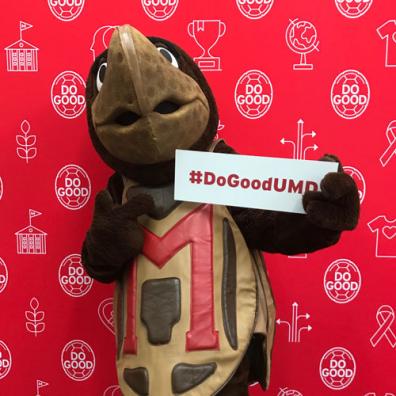 The University of Maryland has been established as a “Do Good” campus, meaning as a community we strive to take initiatives in social change. This mentality is designed to inspire students and the entire UMD community to become aware and educated about social, environmental, and policy issues. Combining that knowledge with expertise can make big changes in our physical and social world. To this end, the Do Good Institute holds monthly “Do Good Accelerators,” which allow speakers from local organizations to lead discussions open to the UMD community about the issue(s) they are working towards changing.
The University of Maryland has been established as a “Do Good” campus, meaning as a community we strive to take initiatives in social change. This mentality is designed to inspire students and the entire UMD community to become aware and educated about social, environmental, and policy issues. Combining that knowledge with expertise can make big changes in our physical and social world. To this end, the Do Good Institute holds monthly “Do Good Accelerators,” which allow speakers from local organizations to lead discussions open to the UMD community about the issue(s) they are working towards changing.
The first Do Good Accelerator of the spring semester introduced Ruthie Mundell, the outreach director for Community Forklift, a non-profit organization in Hyattsville, MD, whose main goal is to reduce construction waste. This company offers pick-up services to collect unwanted or damaged construction material such as wood, granite, and metal to be refurbished and resold. Up to 90% of housing materials can be reused, yet construction debris constitute 25-30% of solid waste. Utilizing the services that the Community Forklift offers allows people to reduce their solid waste footprint and allows for individuals to purchase their own building materials at thrift store prices. This non-profit company gives back to the community in more ways than one: they donate to many non-profits, offer reduced prices and donations to low income families, and have even donated to UMD for art projects. Read more about their mission and upcoming events: http://communityforklift.org/
The second Do Good Accelerator was held on March 26 featuring the Anacostia Watershed Society (AWS). The current project, “Waterway to 2025,” is an initiative to make the Anacostia River swimmable and fishable by the year 2025. The first step they are taking to accomplish this goal is building more elaborate underground tunnel systems to redirect stormwater to avoid overflow and erosion. They have also installed many “trash traps” to catch floating debris to be collected and disposed. AWS allows for a collective of people to voice their concerns about the Anacostia River to policy makers which has helped them implement D.C.’s “bag bill.” They are currently pushing for a “bottle bill” to hopefully reduce plastic bottle use in the community. The Anacostia Watershed Society relies on dedicated volunteers and strong partnerships to make a difference, learn how you can become involved: https://www.anacostiaws.org/
The next Do Good Accelerator is set to take place on Wednesday, April 11 from 12:00-1:30pm in 2101 Susquehanna Hall. It will feature William Murphy, executive director of Mary House, which is a non-profit that helps homeless immigrant families in the D.C. area. Learn more about Mary Houses missions: http://maryhouse.org/
To learn more about the Do Good Institute: https://dogood.umd.edu/
By Rachel Baker, Communications Intern, Office of Sustainability